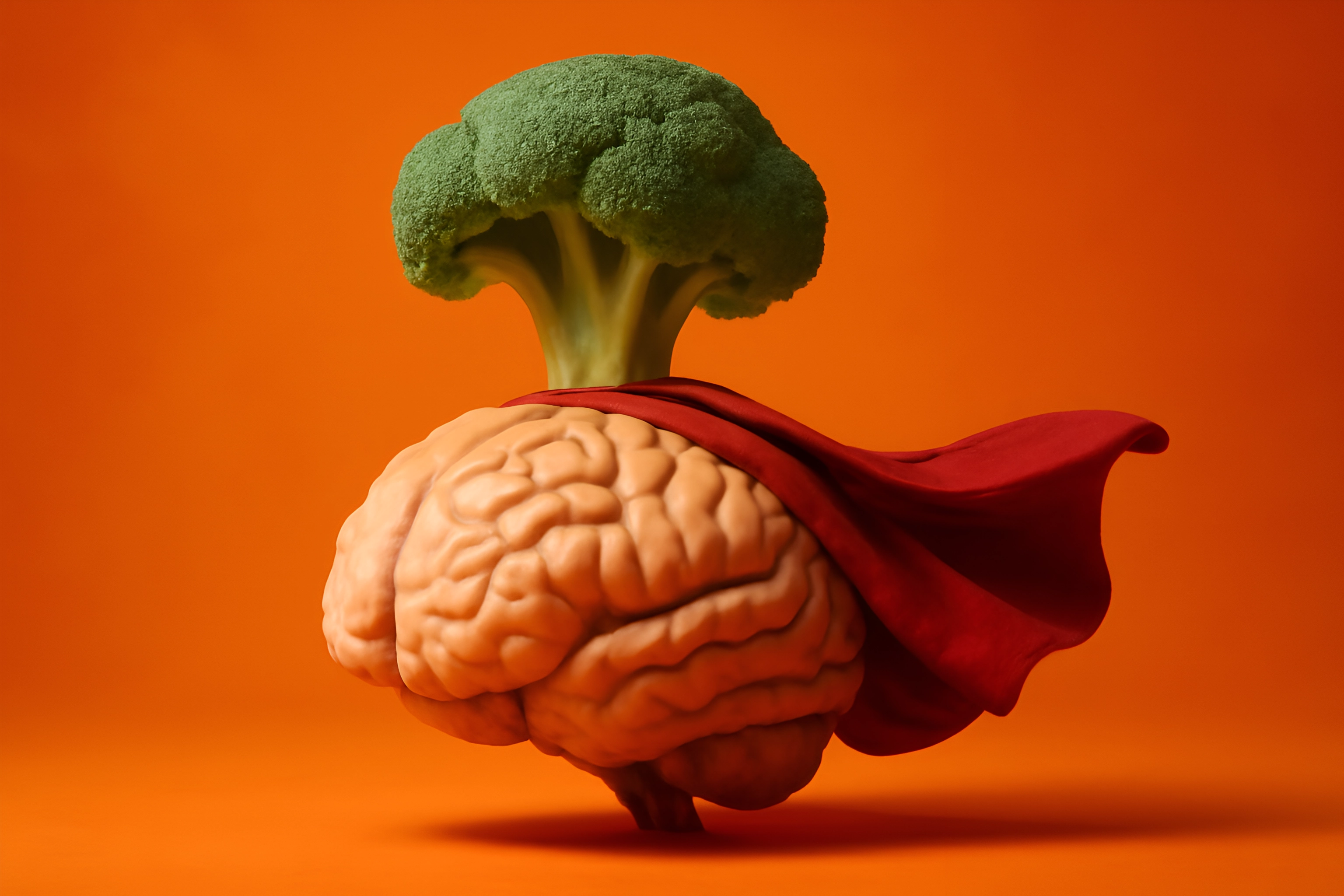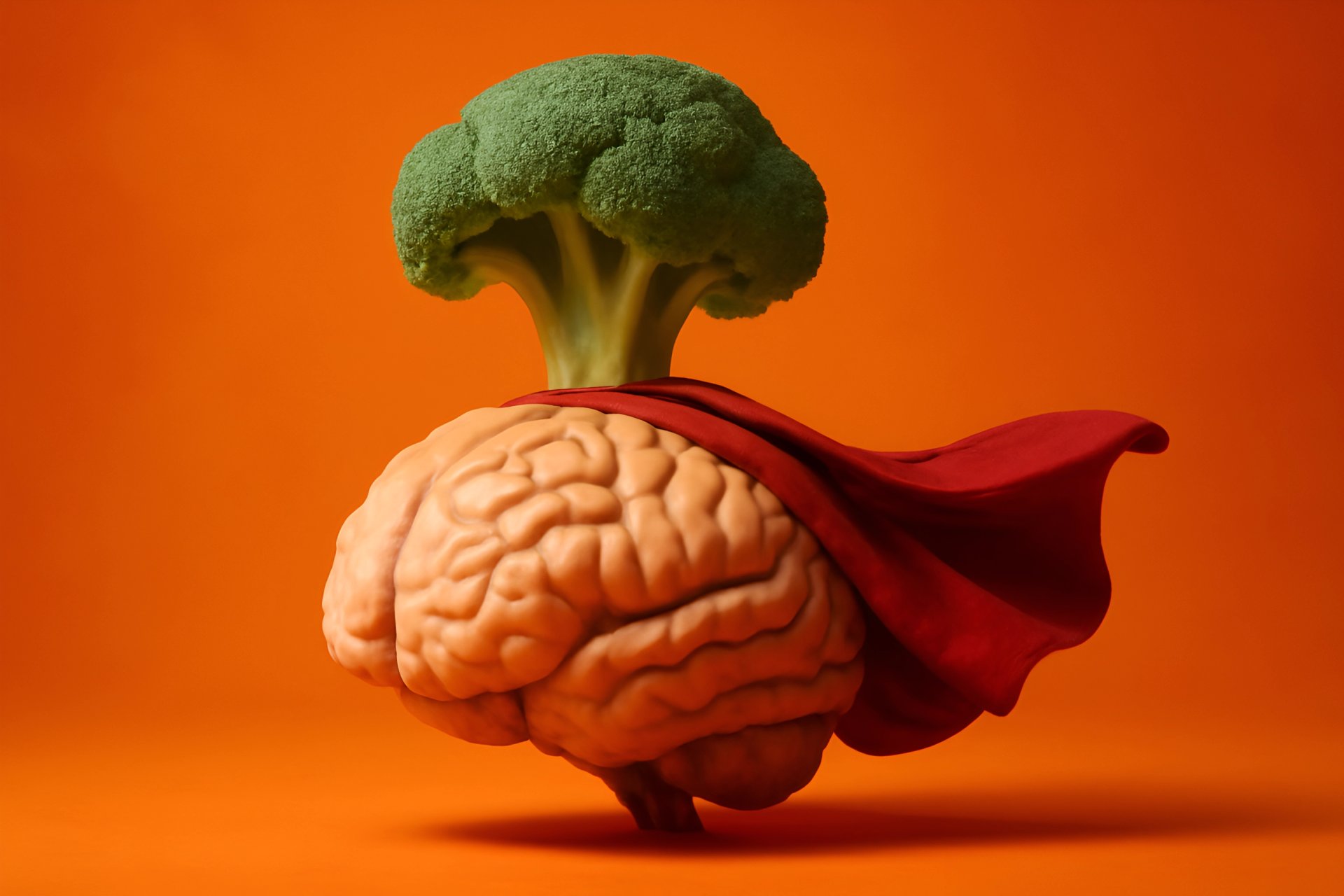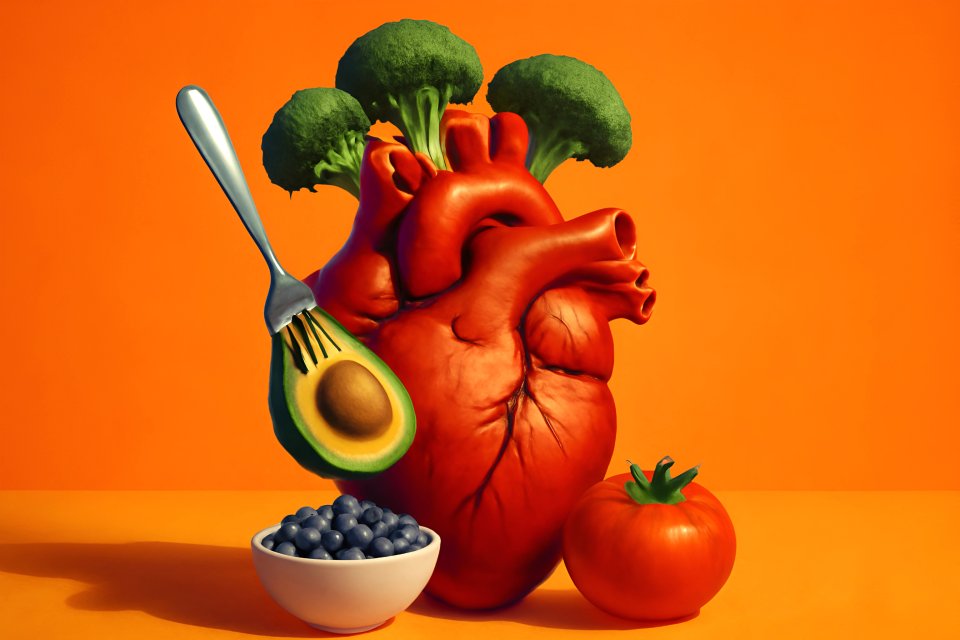
Ever walk into a room and forget why you went in? Or find a name lingering just on the tip of your tongue, refusing to surface? You're not alone. These moments are a common part of life, but they don't have to be your new normal.
After 50, supporting our cognitive health becomes a top priority, and rightfully so. But this isn't a story about decline. It's a story of empowerment—an opportunity to nourish the incredible brain that has guided you through decades of life, love, and learning. The power to protect your memory, sharpen your focus, and secure a future filled with clarity isn't locked away in a complicated prescription; it's waiting for you right in your kitchen.
In this guide, we’ll uncover the science-backed superfoods for brain health for seniors and explore a simple, natural, and delicious cognitive boosting diet. We'll explain why these foods work in simple terms and give you easy, practical ways to add them to your daily meals, starting today.
Why Nutrition is a Game-Changer for Brain Health Over 50
Let's get one thing straight: what you eat directly impacts how you think and feel. The connection between your gut and your brain is a powerful, two-way street. Nourishing your body with the right fuel sends signals that can reduce harmful inflammation, protect precious brain cells, and build a stronger, more resilient mind.
The battle for your brain is often fought against two invisible enemies: inflammation and oxidative stress. Chronic inflammation can cloud thinking and slow down cognitive function, while oxidative stress is like rust on your brain cells, caused by damaging free radicals. The good news is that a diet rich in antioxidants—the "bodyguards" for your brain cells—can neutralize this damage. Furthermore, healthy fats like Omega-3s are the literal building blocks for your brain, essential for maintaining the structure of cell membranes that make learning and memory possible.
This isn't just wishful thinking; it's proven science. Researchers have even designed specific eating patterns, like the MIND diet (a hybrid of the Mediterranean and DASH diets), which has been shown to significantly support brain health and lower the risk of cognitive decline. By focusing on a diet that is actively fighting inflammation, you are taking a decisive step toward safeguarding your mental acuity for years to come.
The Top 5 Memory-Enhancing Superfoods to Add to Your Diet
Forget complicated formulas and restrictive plans. The most powerful tools for a sharper mind are simple, whole foods that are as delicious as they are effective. Let's explore the five champions of brain health.
Fatty Fish (like Salmon & Mackerel): The Omega-3 Powerhouse
Your brain is nearly 60% fat, and it craves a specific type to function at its best: Omega-3 fatty acids. Fatty fish like salmon, mackerel, and sardines are swimming in DHA, a type of Omega-3 that is a primary structural component of your brain and is absolutely crucial for learning and memory. Think of it as the premium fuel your brain needs to build and repair cells, ensuring the wiring for your memories stays strong and connected.
According to the American Association of Naturopathic Physicians, these incredible fats are known to boost brain-derived neurotrophic factor (BDNF), a protein that encourages the growth of new brain cells. This process, known as neuroplasticity, is the very foundation of learning new things and forming lasting memories. Making fatty fish a regular part of your diet is one of the most direct ways to invest in your brain's long-term structural integrity.
Incorporating this powerhouse is easier than you think. Enjoy a beautiful baked salmon fillet for dinner twice a week, add canned tuna to a vibrant salad for a quick lunch, or try smoked salmon on a slice of whole-grain toast for a luxurious and brain-boosting breakfast. The American Heart Association recommends about two servings per week to reap these cognitive rewards.
Berries (especially Blueberries): The Antioxidant Champions
Imagine a team of tiny bodyguards protecting your brain cells from daily damage. That's exactly what the antioxidants in berries do. Blueberries, in particular, are packed with flavonoids called anthocyanins, the compounds that give them their deep, rich color and their potent anti-inflammatory and antioxidant effects.
These compounds are true cognitive enhancers. Research has shown that the flavonoids in berries can help delay short-term memory loss and improve communication between brain cells. One study even found that flavanol-rich berries could improve blood flow to the brain and boost problem-solving speed by a remarkable 11%. This isn't just about preventing decline; it's about actively sharpening your mind.
The beauty of berries is their versatility. Sprinkle a generous handful on your morning oatmeal or yogurt, blend them into a delicious smoothie for an afternoon pick-me-up, or simply enjoy them by the handful as a sweet and satisfying snack. And don't forget: frozen berries are just as nutritious, making them a convenient and budget-friendly option year-round.
Leafy Greens (Spinach, Kale, Collards): The Vitamin K Kings
Your mother was right—you need to eat your greens. Leafy greens like spinach, kale, and collards are nutritional giants, loaded with brain-healthy nutrients like Vitamin K, lutein, folate, and beta carotene. This powerful combination works together to protect your brain and keep it firing on all cylinders.
Research from Northwestern Medicine suggests that these specific nutrients may help slow the pace of cognitive decline that can come with age. Vitamin K, for instance, is involved in forming sphingolipids, a type of fat densely packed into brain cells. Just one serving of leafy greens per day can make a measurable difference in preserving the cognitive abilities you cherish.
Make these greens the foundation of your meals. Use a bed of fresh spinach for a hearty salad, wilt kale into your favorite soup or stew to add a nutrient-packed punch, or blend a handful into a green smoothie for an easy and energizing start to your day. Every bite is a deposit into your cognitive bank account.
Walnuts: The Brain-Shaped Wonder
Nature sometimes gives us clues, and the brain-like shape of a walnut is no exception. Walnuts are a unique and powerful superfood, standing out as the only nut that contains a significant amount of ALA, a plant-based Omega-3 fatty acid. This, combined with their high concentration of antioxidants and anti-inflammatory compounds, makes them a true wonder for your mind.
The combination of healthy fats and antioxidants in walnuts works to reduce brain inflammation and protect cells from the oxidative stress that can contribute to cognitive aging. They are a simple, crunchy, and satisfying way to support the very structure and function of your brain. Think of them as a daily snack that actively works to keep your mind sharp and resilient.
Enjoying walnuts couldn't be simpler. Grab a small handful for a perfect afternoon snack that curbs hunger and fuels your brain. Chop them up and sprinkle them over a salad for added texture and nutrition, or mix them into your morning yogurt or oatmeal for a satisfying crunch.
Turmeric (and Curcumin): The Golden Spice for a Golden Mind
This vibrant golden spice, a staple in curry, holds a powerful secret: curcumin. Curcumin is the active compound in turmeric, and it's a potent anti-inflammatory and antioxidant that has been studied extensively for its brain-health benefits. It's one of the few substances that can cross the blood-brain barrier, meaning it can enter the brain and directly benefit the cells.
Curcumin works by calming inflammation and fighting oxidative damage, two of the key drivers of cognitive decline. Some research suggests it may also help clear amyloid plaques, a hallmark of Alzheimer's disease, and boost levels of the brain-growth hormone BDNF. This humble spice offers profound protection for your most vital organ.
Unleash the power of turmeric in your kitchen. Add a teaspoon to savory curries, soups, and stews for a warm, earthy flavor. Make a comforting "golden milk" latte by warming milk with turmeric, ginger, and a dash of cinnamon. For a simple boost, remember this tip: always pair turmeric with a pinch of black pepper, which contains piperine, a substance that enhances curcumin absorption by up to 2,000%.
Putting It Into Practice: A Sample Brain-Boosting Day
Feeling inspired but not sure where to start? Don't worry. Integrating these superfoods isn't about a strict, complicated diet. It's about making small, delicious upgrades to the meals you already enjoy. Here is what a day of brain-boosting, flavorful eating could look like, providing a simple framework for your own age-defying nutrition meal planning.
For breakfast, you might start with a warm bowl of oatmeal, topped with a cup of mixed blueberries and a generous sprinkle of chopped walnuts. This combination delivers a powerful punch of antioxidants, fiber, and healthy Omega-3 fats to fuel your brain for the day ahead.
At lunch, imagine a large, vibrant spinach salad topped with a perfectly grilled salmon fillet and drizzled with a bright lemon-tahini dressing. This meal is packed with Omega-3s, Vitamin K, and folate, covering all your bases for a sharp and focused afternoon. For dinner, you could enjoy a hearty and comforting lentil and vegetable curry, made with a generous teaspoon of anti-inflammatory turmeric.
And for a snack? A simple handful of walnuts or a crisp apple is all you need to keep your energy stable and your mind clear. This isn't about deprivation; it's about abundance and flavor.
Beyond Food: 3 More Habits for a Sharper Mind
A truly sharp mind is built on a foundation of holistic wellness. While nutrition is a cornerstone, these three additional habits work in synergy with your diet to create a comprehensive strategy for cognitive vitality. They are essential parts of a holistic approach to your health and longevity.
First, move your body. You don't need to run a marathon; consistent, moderate activity like brisk walking, swimming, or strength training increases blood flow to the brain. This vital circulation delivers the oxygen and nutrients your brain cells need to thrive, and it has been shown to improve memory and thinking skills.
Second, prioritize sleep. Sleep is not a luxury; it's a non-negotiable maintenance period for your brain. During deep sleep, your brain works to clear out toxins that accumulate during waking hours and, crucially, consolidates memories, transferring them from short-term to long-term storage. Aim for 7-9 hours of quality sleep per night to give your brain the time it needs to reset and recharge.
Finally, stay curious and connected. Your brain is like a muscle—it gets stronger with use. Challenge it by learning a new skill, doing puzzles, or reading about a new subject. Equally important is social connection, which helps ward off depression and stress, both of which can contribute to memory loss. Consider adding mindfulness practices, like those in our guide to meditation for beginners over 50, to further enhance your mental clarity.
Conclusion: Nourish Your Mind, Live Vibrantly
Protecting your cognitive health doesn't require a drastic overhaul of your life. It begins with simple, powerful choices you make at every meal. By incorporating delicious foods for brain health over 50—like fatty fish, vibrant berries, leafy greens, walnuts, and turmeric—you are taking a proactive, empowering step toward maintaining the mental clarity and focus you deserve.
Your brain has carried you through a lifetime of experiences, challenges, and joys. By nourishing it with these delicious superfoods, you're not just eating; you're investing in a future filled with vitality, sharpness, and engagement. Remember, every healthy choice is a gift to your future self, helping you build a daily routine that supports your mind and body.
What's your favorite brain-boosting recipe or food? Share your ideas in the comments below—let's inspire each other on this journey to vibrant living!
FAQ Section
Are supplements as good as whole foods for brain health?
While some supplements can be helpful, getting nutrients from whole foods is almost always superior. Whole foods provide fiber, antioxidants, and other synergistic compounds that work together for maximum benefit. Always talk to your doctor before starting a new supplement to ensure it's right for you.
How much fatty fish should I eat per week?
The American Heart Association recommends eating about two servings of fatty fish per week. A single serving is around 3.5 ounces of cooked fish, or about ¾ cup of flaked fish.
I'm on a budget. What are some affordable brain-healthy foods?
That's a great question! You don't have to break the bank to eat for your brain. Frozen berries, canned salmon or tuna, lentils, eggs, and seasonal leafy greens like spinach are all excellent, budget-friendly options that are packed with cognitive benefits.












